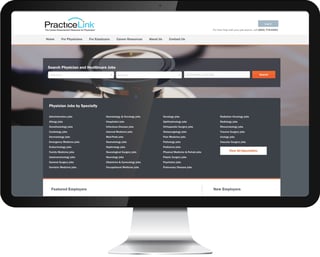
"Some of us may get an hour to review the last three days of email."
That's what fourth-year med student James Mason told the PracticeLink team recently. He was one participant in the physician panel we heard from during our annual company meeting a couple of weeks ago.
He continued, "If your email literally has the terms that are useful to us, I might [find it in a] search. If you abbreviate a state, I may miss it. [You have to] have enough searchable terms when I have 200 outstanding emails."
His comments shed light on the way some time-strapped med students, residents and practicing physicians approach their inboxes: triage-style. Emails don't get dealt with in the order they arrive. Rather, only the messages with the most pressing contents get tended to. The rest must wait.
So how can you ensure your messages get seen and attended to? Here are a few tips I gleaned from the panel's discussion.
1. Use keywords—including abbreviations and full words.
There's no telling if your candidate will search for "WV" or "West Virginia," so if you include one in the subject line, include the other in the body of your message.
Similarly, include other searchable keywords, like city, specialty and any factors that may be of particular interest to the candidate (like "moonlighting" or "stipend" if you're emailing a resident).
2. Answer the big questions in the subject line.
"Understanding your crowd here is really important," said panelist Nik Bhandary, also a fourth-year med student. "Inherently our jobs are to gather as much information as possible, assess and then treat. ... We need that level of information."
He makes a good point. To physicians trained to gather all the most important details, a catchy subject line may not be as effective as a straightforward one.
"Keep it simple," said Mason. "What, when and where in the subject line, and I can make a decision immediately."
3. Make it personal.
If a candidate does open your email, you have a limited amount of time to make an impression before he or she hits delete and moves on. So, as Evan Ellison, D.O., told us, "make it as personalized as possible."
Include specifics about why you think your job matches their personal search criteria (which you can find on their Candidate Profile or inDepth Candidate Interview). This is more important than the general reasons why it's a good opportunity. These details save recipients time by connecting the dots for them.
Additionally, if you're following up on an earlier conversation, remind the candidate of this by replying to your original email. They're more likely to bother with your email if they don't have to go searching for previous threads to make sense of it.
It was clear from the panelists' discussion that most candidates are speaking with many organizations at once. Communicate in a way that demonstrates that you realize this; don't expect them to remember you or your opportunity, provide all relevant details and make your messages as easy to find and skim as possible.









